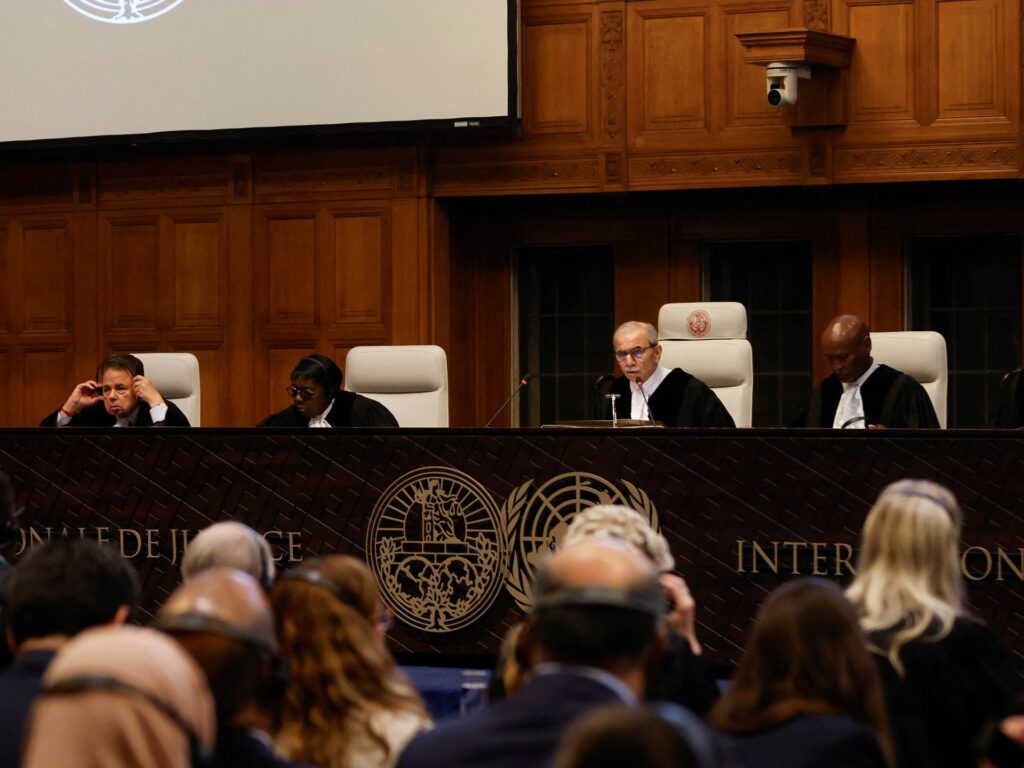Israeli Minister of Settlements and National Tasks, Orit Struck, said that her country is “not obligated to comply with the orders of the International Court of Justice” to stop the fighting in Rafah, while two European officials stressed that the decisions of the International Court are binding and must be implemented.
In an interview with the public radio of the Israeli Broadcasting Authority on Sunday, the Israeli minister described the international court as an “anti-Semitic theater of absurdity.”
Struck – who is from the “Religious Zionism” party – called for “refraining from obeying orders to stop fighting” in Rafah, which were issued the day before yesterday, Friday, at the International Court of Justice in The Hague.
She considered that “the standards that turn a blind eye to institutional, organized and funded anti-Semitism, as is the case in both Ramallah and Gaza, cannot be the standards that dictate how we act,” she said.
She added, “We should not have been drawn into a situation where our security decisions are made by a court with such moral standards. This is not a court of law, but an anti-Semitic theater of absurdity.”
The International Court of Justice in The Hague ruled the day before yesterday, Friday, that Israel must withdraw from Rafah and stop its military activities there, at the request of South Africa, and by a majority of 13 judges to two.
Binding and enforceable decisions
In the other direction, Spanish Foreign Minister José Manuel Albarez said that the decisions of the International Court of Justice are mandatory and must be implemented.
Albaris called for an immediate ceasefire in Gaza and the entry of aid through land crossings, stressing that a ceasefire in the Gaza Strip is necessary to avoid a humanitarian catastrophe.
He said that Madrid will officially recognize the Palestinian state next Tuesday, May 28.
In turn, European Union foreign policy official Josep Borrell said that the decision of the International Court of Justice that required Israel to bring aid into Gaza is an enforceable ruling.
He stated that despite the issuance of a decision by the International Court of Justice, Gaza’s land crossings are closed, there are no outlets for humanitarian aid to enter, and the food situation in Gaza is in the worst condition, while Israeli operations in the Strip continue.
The International Court of Justice in The Hague ruled the day before yesterday, Friday, that Israel must withdraw from Rafah and stop its military activities there, at the request of South Africa, by a majority of 13 judges to two.
Incursion into Rafah
On the other hand, the Israeli newspaper Yedioth Ahronoth claimed on Sunday that the Israeli army reduced its forces penetrating east of the city of Rafah in the southern Gaza Strip, and withdrew the Givati Brigade forces operating there.
The newspaper claimed that after the International Court of Justice in The Hague ruled that Israel must open the Rafah crossing, the army reduced its forces in the east of the city.
She said that the Givati Brigade left east of Rafah for Israel tonight after entering it on the first night of the operation about 3 weeks ago, noting that the Israeli army attributed the reduction of its forces in Rafah to the desire to revive it.
Four combat brigades are still operating in Rafah: Nahal, the 401st Brigade, the 12th Brigade, and the Commando Brigade under the command of the 162nd Division, according to the same source.
The newspaper explained that the departure of Givati Rafah comes amid reports that Israel will allow the reopening of the Rafah crossing by the Egyptian army from the southern side of the crossing to bring in more humanitarian aid, and accordingly, Israeli forces will be removed from the area.
While there has been no official comment from the Israeli army in this regard until now, Anadolu’s correspondent reported that the Israeli forces are still stationed in their positions east and center of the city of Rafah, and are continuing their artillery and air bombardment of various areas of the city, resulting in 11 dead and a number of wounded during the past hours.
Since May 6, Israel has launched a ground attack in Rafah (south), and the next day it seized the Palestinian side of the Rafah crossing, causing it to be closed to the entry of mainly limited humanitarian aid.
Israel has been waging a devastating war on the Gaza Strip since last October 7, leaving more than 116,000 Palestinians dead and wounded – most of them children and women – and about 10,000 missing, amid massive destruction and famine that claimed the lives of children and the elderly.
Israel continues this war, ignoring a Security Council resolution demanding that it stop the fighting immediately, and orders from the Court of Justice demanding that it stop its attack on Rafah, and take immediate measures to prevent acts of “genocide.”

